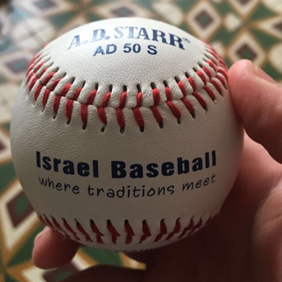Play ball: Virginia Tech student interns with the Israeli baseball team

When Hillel at Virginia Tech Executive Director Sue Kurtz heard that the Israel Association of Baseball was seeking American baseball fans to intern with their teams, she immediately thought of Zach Jones. Jones, then a junior at Virginia Tech, was involved with the Virginia Tech baseball team. Kurtz connected Jones with the Jewish Agency Israel Fellow, Or Shaked, and set him on his way to Israel in Spring 2016 for a four-month internship Masa Israel and Destination Israel.
Jones sat down with Hillel News for a Q&A. Here are highlights from the conversation:
What kind of internship did you have? Did you suit up?
I did a little bit of everything. Upon arriving in Israel, we met with the director for Israel Baseball, Nate Fish, who informed us, although we would all be given a team to coach as well as a team to play on, that we would also have individual responsibilities that would be given to us based on our personal interests. In my case, I was given the task of creating the first ever statistics program for the Israel Premier League, the highest adult baseball league offered in Israel.
How is the Israel Premier League set up? Is it like MLB?
This league is not professional. There are no sponsors, team owners, and we certainly did not get paid to play. In 2007, there was a professional baseball league in Israel, but after the first year it was shut down due to its numerous problems.
There are five teams that make up the Israel Premier League: The Jerusalem Lions, The Tel Aviv Comrades, The Modi’in Miracles, The Ra’anana Raiders and The Academy. The Academy is a team comprised of the eleven or twelve best 16-18 year old baseball players in Israel. These kids were all members of their respective national teams, and practiced baseball every day. The field, which was located at the Baptist Village in Petah Tikva, was a home away from home for these kids, who were from all over the country.
What was coaching like?
The Jerusalem Lions was a group comprised of kids who played for the Israel national team for their age group as well as kids who just loved playing the game. Unlike most teams, I did not have the opportunity to have practice, or even meet with my team before our first game. When I arrived at the game with my supervisor, I could tell that there was a sense of distrust among the players, and why wouldn’t there be? I was a complete stranger who was going to take over a team I didn’t know.
Communicating with the team was troublesome, as most of the kids lived in the Jerusalem area, while my program had me staying in Tel Aviv. As such, I was unable to go to a lot of their practices, though I would often see a few of my players in Petah Tikva, as they were members of the Israel baseball Academy. This academy was crucial in communicating with my team, as I was able to start developing relationships with at least a few of my players.
Did you have a breakthrough moment with your players?
As the season progressed, I could see that I was starting to earn the trust of my team. There was one kid on the team named Daniel – a good kid, but not exactly the best player on the team. One game, my team came in after playing in the field, and I took him over to the side. I asked him to show me his stance, and I kindly showed him mine. My stance looked fluid and comfortable, while his was uncoordinated and uncomfortable. I asked him to show me how he was holding the bat, and then, while still holding the bat, to point his index fingers. You can tell if you’re holding the bat correctly if your index fingers are pointing in the same direction. This helps keep your top hand wrist up as you swung. This prevents your wrists from “breaking” or “rolling over” and as a result, not hitting a weak ground ball to the infield. Sure enough his fingers weren’t in the same direction. I told him to fix it, and in his next at bat, I was stunned when he made solid contact with the baseball. His teammates were even more stunned, and many of them came to me asking to help them with what I helped Daniel with. On that day, I had not only earned the trust of the entire team, but I had earned respect through my baseball knowledge.
Did this experience change you?
I changed in the way I watch the game. Instead of watching to see what happened, I found myself paying closer attention to individual players, how they played the game, their body language, and anything else that I saw that I thought would affect the way they play the game. So the big change was going from viewing the game as player, to viewing the game as a coach, both are very different.